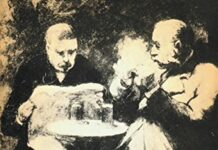
Ebook Info
- Published: 2006
- Number of pages: 544 pages
- Format: EPUB
- File Size: 1.08 MB
- Authors: Gustave Flaubert
Description
Sentimental Education, by Gustave Flaubert, is part of the Barnes & Noble Classics series, which offers quality editions at affordable prices to the student and the general reader, including new scholarship, thoughtful design, and pages of carefully crafted extras. Here are some of the remarkable features of Barnes & Noble Classics:New introductions commissioned from today’s top writers and scholars Biographies of the authors Chronologies of contemporary historical, biographical, and cultural events Footnotes and endnotes Selective discussions of imitations, parodies, poems, books, plays, paintings, operas, statuary, and films inspired by the work Comments by other famous authors Study questions to challenge the reader’s viewpoints and expectations Bibliographies for further reading Indices & Glossaries, when appropriateAll editions are beautifully designed and are printed to superior specifications; some include illustrations of historical interest. Barnes & Noble Classics pulls together a constellation of influences—biographical, historical, and literary—to enrich each reader’s understanding of these enduring works. Considered one of the greatest French novels of the nineteenth century, Sentimental Education blends brilliantly realized details of a tumultuous time and place with the intimate story of a lifelong romantic obsession, one that closely mirrors the central passion of Flaubert’s own life. Set amid the violent social upheaval of the Revolution of 1848, the novel tells of young Frédéric Moreau’s idealistic attraction to a married woman some years his senior. Smitten by his first sight of Madame Arnoux, Frédéric idolizes her for many years, despite her refusal to encourage him and his own indecision. He befriends her husband, an art dealer, in order to be near her, and soon finds himself drawn first into Jacques Arnoux’s heady social circle and then into his disastrous financial speculations. As a young teenager, Flaubert himself became romantically obsessed with a married woman with whom he kept in touch for the rest of his life, and many of the characters in Sentimental Education, including Madame Arnoux, are based on friends and acquaintances of the great French author. In this vivid novel, all are beset by financial difficulties, ideological conflicts, and friendship betrayed as their lives are changed forever by the revolution.Claudie Bernard is Professor of French literature at New York University, and the author of Le Chouan Romanesque, Balzac, Barbey d’Aurevilly, Hugo, Le Passé recomposé, le roman historique français au dix-neuvième siècle, and of many essays on nineteenth-century French literature and the history of ideas.
User’s Reviews
Editorial Reviews: About the Author Claudie Bernard is Professor of French literature at New York University, and the author of Le Chouan Romanesque, Balzac, Barbey dAurevilly, Hugo, Le Passé recomposé, le roman historique français au dix-neuvième siècle, and of many essays on nineteenth-century French literature and the history of ideas. Excerpt. © Reprinted by permission. All rights reserved. From Claudie Bernard’s Introduction to Sentimental EducationFlaubert’s most typical posture was of bitter irony. In his correspondence, he admitted that he laughed at everything—facts, people, feelings, and even those matters dearest to his heart, as a method to test them. His sarcasm did not spare current events. In March 1848 he told his mistress Louise Colet: You ask my opinion about all that has just been done. Well! It is all quite droll. . . . I profoundly delight in the contemplation of all the flattened ambitions. I don’t know if the new form of government and the social state that will come of it will be favorable to Art.. His mockery denounced all ideological as well as esthetic clichés—all the discourses that speak through us without our control. He compiled a spicy Dictionnaire des idées reçues(1913; Dictionary of Received Ideas). And his last and unfinished book, Bouvard et Pécuchet (1881), an encyclopedic satire of contemporary practices and knowledge, ends up with the two false scholars returning to their original jobs, that of copyists.Flaubert’s major preoccupation transcended any school; he called it “style,” in the larger sense of artistic creation. Style for him was as much behind the words as in the words, as much the soul as the flesh of a work. It was not contingent on a topic: “There are neither beautiful nor ugly subjects, and one could almost establish as an axiom, if one adopts the point of view of pure Art, that there is no subject at all, style being in itself an absolute way of seeing things.” He toyed with the notion of composing “a book about nothing, a book without any exterior attachment, which would hold together by the internal force of its style, like the earth holds up in the air without being supported; a book that would have almost no topic, or at least whose topic would be almost invisible, if that is possible.”While Baudelaire searched for the flowers, the beauty of evil, Flaubert assigned himself the task of extracting the beauty of the mediocre, the ordeal of resuscitating ancient Carthage in Salammbô (1862), and the challenge of following two idiots, Bouvard and Pécuchet. A recluse in his house at Croisset, in Normandy, like the saints he liked to describe, he experienced the “throes of style”: the anxiety of cutting all banalities, the painful pursuit ofthe proper word, the trial of oral recitation, and the endless corrections and accumulated drafts. The final manuscript of Sentimental Education is 500 pages long, but the first drafts comprise no less than 2,350 sheets written front and back.
Reviews from Amazon users which were colected at the time this book was published on the website:
⭐I agree very much with Bruce Kendall’s review, particularly in relation to the novel’s relation to Stendhal, whose work Flaubert disparaged, as is only fitting among masters.I do not know how exactly _Madame Bovary_ has achieved a more premier position than _Sentimental Education_. The latter ranks, in my mind, as one of Western literature’s greatest achievements, bar none. The prose is incomparable (realism is never prosaic in Flaubert—witness the descriptions, for example, in the latter part of Chapter I, Part Three), and the attempt to reproduce the vicissitudes of one’s youth in what was in many ways the doldrums of a lost age of bourgeois self-indulgence can only be viewed as bitter if one has an inherent predisposition against honesty. If you read this work carefully, you will begin to comprehend the great questions assayed by Proust; but it is worthwhile to read Stendhal (who took little interest in finding the ‘mot juste,’ because he was cut of a different fabric) in conjunction with Flaubert because the two are like those great Titanic trees described in _Sentimental Education_, as they grew up under different circumstances, with vastly different temperaments, and each possessing his own unique genius.
⭐It’s no spoiler to say that there’s no plot in this rambling but sharp snapshot of mid-1800’s Paris. There characters feel like they stepped right out of early 21th century Los Angeles or Brooklyn. Caught in a scene that celebrates itself, everyone in this book is a raging opportunist, willing to sell out all their friends and principles to get ahead, but nobody is really very good at it. Sure, Frederic and Rosanette would like to be in Dangerous Liasons, juggling lovers and champagne – but they’re just not smart enough! And that’s precisely what makes it so funny. To wonderful comic effect (or tragic, depending on your point of view), Flaubert illustrates that people don’t change, no matter the time or the place. Throughout, the writing is evocative and almost dreamlike, though its subjects…not so much. They’re just messes.
⭐It may be that everything wrong with this edition of Gustave Flaubert’s Sentimental Education is tied to the translation. If so my most fervent plea is that you avoid This Kindle edition. It is annotated as having an “Un-credited Translation” and was taken from a 1922 edition. If this is Realism/Naturalism, I get why so many do not like that style. I have read others, including Madam B and believe that it can be very worthwhile. I do not get how this qualifies as other than too much about too many people not worth our time.Buried in here is an almost adolescent love story between a married woman, Mme Arnoux and our younger but not that young Frederic Moreau. Taking a moment to note reams of side stuff about revolution, much of it almost satirical except that none of it matters. In fact much of everything in this book is almost satirical, except that none of it matters. We meet Fredrick as his is an advanced student of the law, not esp well off and not in a rush to earn a leaving. Several years will pass during the novel, mostly because we are told that they do. Fredrick manages to use these years to accomplish nothing, and getting enough money that his plan is to continue to do not much of anything. A reasonable response to money. However, nothing about his maturity, emotional life or his interpersonal skills improve. It is not that he is a wastrel, just that he is supremely self-centered and completely lacking in any ability to make and stick to a decision, a cause, a love affair, a.. what else you got? To say the least, loyalty is not his leading characteristic. Much of his love life, lust life? Fiddling with about with women reads like a YA high school romance. I do, I won’t , may I will, she is cute, she is bad, I will get on her good side with gifts and repeat. For the record, his sleeping arrangements are perhaps more sophisticated than in the typical YA romance, but ever so discreetly written as not to offend. Remember Mme Arnoux? She is married to a prize lose. He is unworthy of her. Fredrick is unworthy of her. Most of the pages are you waiting about wondering if, when and how either one will get their comeuppances.Along the way he will dally along with a variety of women for hire, if the upper class of that service. Attend lavish banquets (please notice the 20 kinds of mustard) splurge in the expensive parts of café society attend what reads like a very delicately described orgy, or more exactly a bordello masked ball.Very exciting except that in this translation it is mostly dull.A fairly large support cast will come and go, rather like the money Fredrick gets and spends. Exactly what these people do besides fill pages is hard to explain. Or not worth explaining, take your pick.I do not like thee Sentimental Education.The reason why (perhaps) the translation tellsBut this I know and know too wellI do not like thee Sentimental Education
⭐The competition is the Oxford Classics version by Douglas Parmee. Given that L’EDUCATION is one of the greatest novels of the 19th century, reading the best translation is imperative if you’re not Francophone.Robert Baldick’s version, here under review, was made over 50 years ago, not long before Baldick’s untimely death at age 47. In this edition it’s been revised, though only minimally, by Geoffrey Wall.Compared with Parmee, Baldick is more literal. If you’re looking for a trot, Baldick’s is the version to buy.On the other hand, it reads beautifully and even with my imperfect understanding of French, I think it’s an excellent translation, as close to Flaubert as you’re going to find in English.But, honestly, the same could be said of Parmee’s less literal version. No writer goes into another language without some loses, particularly a stylist like Flaubert, but if you read either Baldick or Parmee, you’re going to get the essence of Flaubert’s masterpiece.In fact, you should read both. Ford Madox Ford said that L’EDUCATION should be read at least 14 times to be thorougly appreciated (apparently he was superstitious about the number 13). Reading two English translations is a lot less daunting, and who knows? you might want to reread one or both of them.
⭐Probably the Penguin translation is better; indeed, it could not be a lot worse. Some sentences were simply incomprehensible or meaningless in English. On many occasions, I didn’t know who ‘he’ was referring to, after a previous paragraph had mentioned two or three different characters.I was interested enough in Frederick’s character to finish the book, but it was often hard going. The immorality and decadence of the upper classes in Parisian society is on show, and not one character, apart from the saintly Madame Arnoux, is sympathetic at all. I found the stultifying social conventions of the time much less comprehensible than in Jane Austin, say. Knowledge of French history and political figures of the time is assumed by the author, although this can be safely glossed over without losing the thread of the story.I would struggle to recommend this book (or at least this version) to anyone really.
⭐A quality read from the master of the novel
⭐Excellent!
⭐An absorbing read which brings to life a society not too distant from our own.My only criticism would be the awkward nature of the translation.
⭐Sentimental Education is a kind of coming of age yarn set within the framework of French, chiefly Parisian, society. The subject of the book is leading character Frederick’s obsession with Madame Arnoux, an older married mother of two.Frederick leaves his provincial village of Nogent in an attempt to make his name in Paris, with vague notions of a career in law or perhaps as a local state official. However, his vague notions become even more vague when his path crosses that of Madam Arnoux. She is wife to a moderately successful journal editor, but Frederick determines that he shall worm his way into the Arnoux social circle and, eventually, Madam Arnoux’s affections.The pursuit of Arnoux is littered with obstacles – illicit affairs, shady business dealings, gossip, scandal and the staples of many French novels of the time: politics, revolution and the conventions of society.Sentimental Education is much less concerned with political events than Les Miserables, with only fleeting glances of revolution, which most of the central characters regard with indifference. It is less stinging in its examination of class in Parisian society that the salon-laden Father Goriot. There are references to wealth and poverty but only in connection with the central characters of the book, who seem to flit between debt, often between each other, inherited wealth and squandered savings.The key thread to the book is Flauberts examination and portrayal of Frederick’s all-consuming love for Madam Arnoux. The author’s description of the uncertainty, giddiness and heartache experienced by Frederick is so clear and beautifully described that it almost brings a note to the stomach of any reader who can recall their first teenage crush.Flaubert is wonderful when describing the courting process – especially the delicacy of a complex process made more fraught by the fact one of the party is married. The read is given an insight into the torment Frederick endures through stolen kisses, secret walks and loving glances.For this reader at least, the book fell away as the story progressed. Each character seemed to wrong another, with relationships descending into fueds and spiteful gossip. Love and brotherhood become polluted in a sea of bile and ill feeling.Frederick’s quest, which had at first seemed so naive and pure, is not immune from the bad odour and his ill humour makes him increasingly difficult for me to like, let alone root for. His random acts of unkindness and propensity for spoilt-brat tantrums made him tiresome.In conclusion, the thrill of the chase is enchanting and vivid. The problem is, the tangled web of the narrative left me feeling like I couldn’t care less if the quest were fulfilled.
Keywords
Free Download Sentimental Education (Barnes & Noble Classics) in EPUB format
Sentimental Education (Barnes & Noble Classics) EPUB Free Download
Download Sentimental Education (Barnes & Noble Classics) 2006 EPUB Free
Sentimental Education (Barnes & Noble Classics) 2006 EPUB Free Download
Download Sentimental Education (Barnes & Noble Classics) EPUB
Free Download Ebook Sentimental Education (Barnes & Noble Classics)




